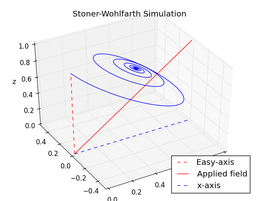Understanding Stochastic Processes in Interacting Spin Models
- Research Team
- Oliver Laslett
A useful way to study randomly fluctuating systems is using stochastic Langevin dynamics (LD), where dynamical systems are represented by differential equations and augmented with random terms. Under specific conditions these can yield a Fokker-Planck equation, representing the evolution of the probability density function for the system states. However, these problems can also be dealt with in a probabilistic manner, using the master-eqution (ME) approach.
The LD approach is typically applied to magnetic spin systems by using the Landau-Lifshitz-Gilbert equation; however, at long time scales this can become prohibitively expensive to compute with any reasonable level of accuracy; this is a particular problem for more complex interacting systems. Where the Fokker-Planck solution cannot be determined, the long-time dynamics can only be computed using approximation methods, such as the ME.
The objective of this project is to develop efficient computational models to use both of these approaches side-by-side, in order to determine the conditions under which the ME approach provides a reasonable approximation of the equilibrium results of using a dynamical approach at long time-scales.
A secondary objective of the project is to explore recent, novel solutions to implementing the above models; more specifically, the use of the julia programming language for developing parallel algorithms.
Categories
Physical Systems and Engineering simulation: Micromagnetics
Algorithms and computational methods: Molecular Dynamics, Monte Carlo
Programming languages and libraries: C, Julia, MPI, Python
Computational platforms: Linux, Mac OS X
Transdisciplinary tags: Complex Systems
